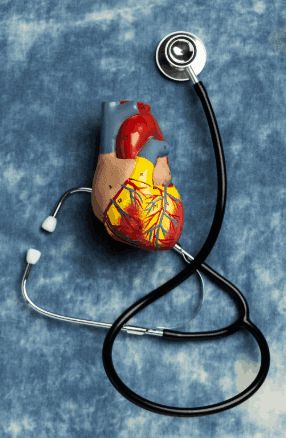Heart Health: Guide to Keeping Your Heart Strong on Heart Day
- September 29, 2025
- Abrol Hospital
World Heart Day is a global initiative aimed at raising awareness about cardiovascular diseases, which remain the leading cause of death worldwide. Our heart is a vital organ, tirelessly pumping blood and oxygen to sustain life. Despite its critical role, heart disease affects millions, but much of it can be prevented through education and healthy lifestyle choices.
Why is Heart Health Important?
The heart is often described as the engine of the body. It works continuously, about 100,000 times a day, to pump blood through a complex network of arteries and veins. This circulation delivers oxygen and essential nutrients to every cell, enabling our organs to function correctly. When the heart is healthy, it supports overall vitality, physical stamina, and mental clarity. However, if heart health declines, the consequences can be severe, leading to diminished quality of life or even fatal outcomes. Maintaining a healthy heart is therefore fundamental not only for longevity but also for day-to-day wellness.
Common Heart Diseases to Know
Understanding the types of heart diseases helps in recognizing symptoms early and seeking timely care.
Coronary Artery Disease (CAD): This condition occurs when the coronary arteries, which supply blood to the heart muscle, become narrowed or blocked by plaque deposits made up of fat, cholesterol, and other substances. This buildup restricts blood flow, leading to chest pain (angina) and increasing the risk of heart attacks. CAD is the most prevalent heart disease and a major contributor to heart attacks globally.
Heart Attack (Myocardial Infarction): A heart attack happens when blood flow to a part of the heart is suddenly blocked, typically by a blood clot. This interruption causes damage or death to part of the heart muscle. Symptoms often include severe chest pain, shortness of breath, sweating, and nausea. Immediate medical attention is crucial to minimize damage and improve survival.
Heart Failure: Unlike a heart attack, heart failure refers to the heart’s inability to pump blood efficiently. This can result from conditions like high blood pressure, CAD, or previous heart attacks. Symptoms include fatigue, shortness of breath, swelling in the legs, and persistent coughing or wheezing. Managing heart failure involves medications, lifestyle changes, and sometimes medical devices.
Arrhythmias: These are irregular heart rhythms that can be too fast (tachycardia), too slow (bradycardia), or erratic. While some arrhythmias are harmless, others can lead to dizziness, fainting, or stroke if not treated. Common types include atrial fibrillation, which increases stroke risk and requires careful management.
Risk Factors for Heart Disease
Unhealthy Diet: High intake of saturated fats, trans fats, and excessive salt can increase cholesterol and blood pressure.
Physical Inactivity: Lack of exercise contributes to obesity, high blood pressure, and poor cardiovascular health.
Smoking: Damages blood vessels and reduces oxygen in the blood.
High Blood Pressure & Diabetes: Both conditions strain the heart and blood vessels.
Stress: Chronic stress can increase heart rate and blood pressure.
Family History: Genetics can play a role in your heart disease risk.
How to Keep Your Heart Healthy
- Eat a Heart-Friendly Diet: Focus on fruits, vegetables, whole grains, lean proteins, and healthy fats like those found in nuts, seeds, and fish. Limit processed foods and sugary drinks.
- Stay Active: Aim for at least 150 minutes of moderate-intensity aerobic exercise each week, such as walking, cycling, or swimming.
- Avoid Tobacco: Quitting smoking and avoiding secondhand smoke significantly reduce heart disease risk.
- Manage Stress: Practice relaxation techniques such as meditation, yoga, or deep breathing exercises.
- Monitor Your Health: Regularly check your blood pressure, cholesterol levels, and blood sugar, and follow your doctor’s advice.
- Maintain a Healthy Weight: Excess weight strains the heart and increases the risk of heart disease.
Heart Day - Take Control of Your Heart Health Today!
World Heart Day is more than just a date on the calendar—it’s a call to action. Whether it’s taking a brisk walk, eating a colorful salad, or educating loved ones about heart health, small steps can lead to big changes.
If you or your loved ones are concerned about heart health or want to learn more about prevention and treatment, don’t wait—consult the experts at best hospital in Gurdaspur. Our experienced cardiologists are dedicated to providing comprehensive care, personalized treatment plans, and heart health awareness to help you live a healthier, longer life.
Book your appointment today and take the first step towards a stronger heart!

FAQs (Frequently Asked Questions)
Adopt a healthy diet, exercise regularly, quit smoking, manage stress, and follow your doctor’s advice.
Eat well, stay active, avoid tobacco, control blood pressure and cholesterol, and get regular check-ups.
Lower risk factors like high blood pressure and cholesterol through lifestyle changes and medical care.
Leafy greens, berries, fatty fish, nuts, whole grains, and healthy fats like olive oil.
Quit smoking, reduce salt, start walking, and practice stress relief techniques.



